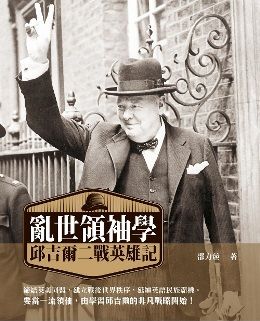
Finest Hour 176
Books, Arts & Curiosities – The Wisdom of Winston

July 15, 2017
Finest Hour 176, Spring 2017
Page 50
Review by Angela Sugiyama
邵力競 (Shao Lijing) 亂世領袖 學: 邱吉爾二戰英雄記 (Leadership in an Age of Turbulence: the Heroic Legacy of Winston Churchill in World War II), Enrich Publishing and Hong Kong Economic Journal, 2015, 254 pages, HK$118. ISBN 978–9888292653
Western writers have long explored the unique legacy of Winston Churchill. Chinese writer Shao Lijing takes a reflective approach, arguing that only when politicians learn the art of politicking itself can effective leadership be established for upholding democracy.
Born in Shanghai, Shao was educated in Hong Kong and earned his Ph.D. at Oxford. Previously he wrote a series of articles called 十四年亂象回顧 (The Reflection on Fourteen-Year Frenzied Phenomena). These articles analyze in depth the issues involved in the governing of Hong Kong. Shao suggests that Hong Kong’s leadership should borrow Churchill’s knowledge of statecraft and adapt it to today’s rapidly-changing and more challenging world, that people need to ponder how the British Parliament kept running even during the most difficult times of the War, and that historians and government officials need to rethink in what way the post-war powers were reconstructed, how colonialism and nationalism evolve, and what challenges democracy is facing today.
To find lessons in the most effective methods for running a democratic government facing a mortal threat, Shao examines Churchill’s Memoirs of the Second World War. For Shao, to learn the lessons of war is to avoid the actuality of war. He argues that wars in the 1920s, economic and political, led to the Second World War. Future tragedies can result if people do not now reflect upon the causes of these earlier conflicts. Taking the surrender of Singapore as an example, Shao suggests that many politicians in Hong Kong need to learn from Churchill and not act like “事後孔 明 [the wise man after the event]” (85).

2024 International Churchill Conference
One of the strengths of the book is Shao’s use of Chinese wisdom to explore the acumen of the leadership of the Western world. The phrase “歪打正着 [hit the mark by a fluke]” on page 63, for example, is used to describe a division of German paratroopers who were almost completely wiped out in Southern Greece, and yet, because of this near-disaster, the British and the Americans learned and started building up their own paratrooper divisions. The author applies the phrase “將在外, 君命 有所不受 [A commander is exempted from the king’s dictation on a battlefield]” (77) to describe an episode when General Montgomery did not obey Churchill’s order, but Churchill still appreciated his courage and audacity. Other splendid Chinese idioms in this book include “先禮後兵 [try peaceful means before resorting to force]” (182), which is used to describe Churchill’s attitude towards Hitler, and “不拘小節 [do not bother about trifles]” (196), which is used to describe Churchill’s humor and his big heart. Readers who understand Chinese will find this book most enjoyable.
The book does three things very effectively. First, Shao puts his emphasis on the core values of freedom and democracy in the Western world. Second, he shows how the English language connected the British and the Americans in defense of these values, and finally Shao illustrates well the British national spirit as represented by the wartime motto “Keep Calm and Carry On.” Shao is also especially good at translating Churchill’s core ideas into appropriate Chinese equivalents, such as when he observes that Churchill’s statement, “The odds were great; our margins small; the stakes infinite” (250), may be rephrased to something like: “The chances of winning (in this lottery) are one in a million; we do not have many resources to use; we have no other option but to live or die” (250).
Shao extracts the most important events and conflicts from The Second World War and streamlines them into a 254-page book that still represents the war’s triumphs and tragedies with suitable power. The translation of parts of The Second World War into Chinese itself stands as a great accomplishment. This comprehensive text will be helpful for college students and readers who are interested in history and political science.
Angela Sugiyama is a graduate student of history at California State University, Fullerton.
Subscribe
WANT MORE?
Get the Churchill Bulletin delivered to your inbox once a month.


